Featured Stories
-

Gift of Chinese calligraphy
Feb 14, 2022The Lo Chia-Lun Calligraphy Collection, donated by his daughter Jiu-Fong Lo Chang and her husband Kuei-sheng Chang, will transform the University of Michigan Museum of Art’s Asian art collection, adding an impressive breadth of works to an already stellar collection of Chinese paintings and ceramics.
Learn more about this gift -
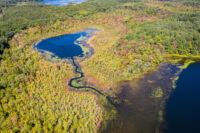
Global forest biodiversity
Feb 7, 2022A new study involving more than 100 scientists from across the globe and the largest forest database yet assembled estimates that there are about 73,000 tree species on Earth, including about 9,200 species yet to be discovered. The global estimate is about 14% higher than the current number of known tree species.
Learn more about this study -
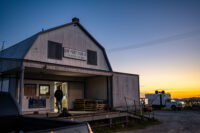
Sustainable food network
Jan 31, 2022Frank Turchan, the executive chef at U-M Dining has been visiting markets, farms and fisheries across the state of Michigan to provide fresh, local and sustainable foods within the dining halls at U-M. Michigan Dining serves about 20,000 meals across nine dining halls on a daily basis, and all students have access to local produce and whitefish.
Learn more about this effort -

Seers and Purveyors of Luck
Jan 24, 2022Dr. Zev Harel is a survivor of Auschwitz. He is a 1967 MSW graduate of the U-M School of Social Work. He is an evangelist of luck.
Learn more about Dr. Harel’s story -

2022 MLK SYMPOSIUM
Jan 15, 2022The Rev. Dr. Martin Luther King Jr. Symposium provides opportunities to participate in lectures, live performances, exhibits, workshops and community service projects sponsored by academic and non-academic units, student and staff organizations and community groups. The theme of the 2022 MLK Symposium is “This is America.”
Learn more about the 2022 Symposium events -

A new frontier
Jan 10, 2022On a normal day, during a normal year, the U-M Library’s popular Computer & Video Game Archive is abuzz with activity. Located in the basement of the Duderstadt Center on U-M’s North Campus, the CVGA has continued to maintain its dual mission of providing users access to their game collection while also preserving them for future research and scholarship.
Learn more about this collection -

Detroit River narratives
Jan 3, 2022For a long time, the importance of the Detroit River to the history and identity of southeast Michigan has not been recognized by many area residents. U-M's Detroit River Story Lab leverages the resources of the university community and local organizations to research and amplify stories of the Detroit River to bring its rich history and current challenges to life for the local community.
Learn more about this community project -

Generations connect
Dec 13, 2021In an effort to fight loneliness and bring generations together, U-M alum Emily Lerner founded Perfect Pair in 2020 — an organization that matches seniors at assisted living facilities with college students who have similar interests. So far, Perfect Pair has made 52 matches with 100 college student volunteers in seven partner communities in Ann Arbor, Farmington Hills, Northville and Saline.
Learn more about this program -
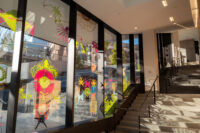
Unseen world of microorganisms
Dec 6, 2021With COVID-19, microorganisms have dramatically migrated from natural science and medicine onto center stage in politics, history, and civil society. Through the artistry of Jim Cogswell, microorganisms can be seen in a delightful and colorful expression on the windows of the U-M Museum of Natural History.
Learn more about this installation -

Symphony of Forgotten Geniuses
Nov 29, 2021In her new book, Singing Like Germans, Kira Thurman tells the story of the Black classical musicians in Central Europe whose compositions, performances, and hidden histories deserve our ears.
Learn more about this hidden history -

Caring Throughout Crisis
Nov 22, 2021Charles Williams II, pastor of the Historic King Solomon Baptist Church in Detroit, has mobilized hundreds of people to make sure the city's most vulnerable are cared for. As he pursues his doctorate in social work and sociology at U-M, he’s been researching how neighborhood-level Black churches can play an important role in connecting underserved populations with the resources they need.
Learn how Black churches expanded services -

Robotically fabricated timber structure
Nov 15, 2021A new structure at U-M’s Matthaei Botanical Gardens brings leading-edge fabrication research to the public space. Led by Arash Adel, assistant professor of architecture at U-M’s Taubman College of Architecture and Urban Planning, the timber pavilion—known as Robotically Fabricated Structure, or RFS—explores new responsible and precise methods of construction.
Learn more about this research -
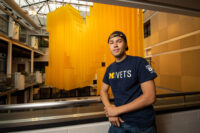
Veterans week
Nov 8, 2021When considering options for completing his degree, Dominic Petersen knew that — thanks to its wealth of resources and veteran-specific programs — one route stood out among the rest. When Dominic arrived on campus, he joined nearly 1,000 other military-connected students, comprising a valued and vital component of the campus community.
Learn more about Veterans on campus -
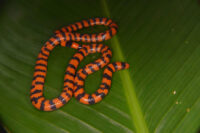
Snake dietary diversity
Nov 1, 2021Modern snakes evolved from ancestors that lived side by side with the dinosaurs and that likely fed mainly on insects and lizards. A new U-M study shows that early snakes capitalized on that ecological opportunity and the smorgasbord that it presented, rapidly and repeatedly evolving novel dietary adaptations and prey preferences.
Learn more about this research -

Flint bookstore
Oct 25, 2021After falling in love with reading at UM-Flint, alum Egypt Otis decided to open the Comma Bookstore & Social Hub in downtown Flint. It is one of the only 6 percent of Black-owned independent bookstores in the country. She features the works of writers and artists of color throughout her store to empower and inspire the community while also contributing to the local economy.
Learn more about the Comma Bookstore -
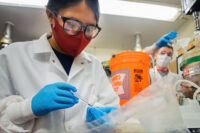
Energy from waste
Oct 18, 2021Cattle are supremely efficient at digesting tough materials, and a proposed energy-production system based, in part, on cow stomachs could generate 40% more power from municipal waste streams, at a 20% reduced cost—and provide a viable alternative to sending waste to landfills. Led by U-M, the project includes partnerships with Argonne National Laboratory, Northwestern University and others
Learn more about this research -
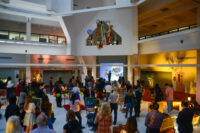
Using art in social work education
Oct 11, 2021“Realm of the Dead” is an autobiographical project that uses self-referential theater as a vehicle for self-healing and advocacy. Based on pedagogy and theater of the oppressed, it intends to advance social work research and practice, as tools of critical reflection, personal growth and advocacy.
Learn more about this performance -

Cass Coasters
Oct 4, 2021Through U-M’s Integrated Product Development course, students from business, engineering and art and design worked with Cass Community Social Services in Detroit to develop a new product that recycles old building materials into glass coasters.
Learn more about Cass Coasters -
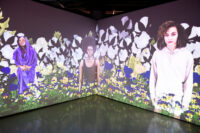
Love & Data
Sep 27, 2021Algorithms are everywhere. They use personal information to offer up suggestions for our entertainment experiences; they filter our social media content; and they’re also used for purposes we’re not always aware of—like predicting the likelihood of repeat offenders in the criminal justice system. Stephanie Dinkins’ new U-M exhibition explores bias and inequality within AI systems.
Learn more about this exhibition -

Small changes in diet could help you live healthier
Sep 20, 2021Eating a hot dog could cost you 36 minutes of healthy life, while choosing to eat a serving of nuts instead could help you gain 26 minutes of extra healthy life, according to a U‑M study. The study, published in the journal Nature Food, evaluated more than 5,800 foods, ranking them by their nutritional disease burden to humans and their impact on the environment.
Learn more about this study -

Illuminated 9/11 halftime tribute
Sep 12, 2021In a dazzling presentation from start to finish, the Michigan Marching Band’s Sept. 11 halftime show on Saturday commemorated the 20th anniversary of the terrorist attacks. The stadium erupted in applause as the marching band’s members spelled out the word “heroes” to start the show while launching into John Williams’ “Summon The Heroes.”
View images and video from the show -
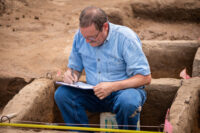
Michigan Clovis Site Discovered
Sep 5, 2021An independent researcher along with University of Michigan researchers have identified a 13,000-year-old Clovis camp site, now thought to be the earliest archaeological site in Michigan. Clovis groups are identified by their unique spear points.
Learn more about this discovery -

Welcome Back
Aug 27, 2021The excitement in the air in Ann Arbor is palpable. U-M students are back in town and ready to start the new school year. There are a variety of Welcome Week events happening across campus to help students get back into the swing of things. Go Blue! #WelcomeHome
View the 2021 Welcome to Michigan events -

PrivacyMic
Aug 23, 2021Microphones are perhaps the most common electronic sensor in the world, with an estimated 320 million listening for our commands in smart speakers. The trouble is that they’re capable of hearing everything else, too. A team of U-M researchers has developed a system that can inform a smart home—or listen for the signal that would turn on a smart speaker—without eavesdropping on audible sound.
Learn more about this prototype technology -

Bird-like wings
Aug 16, 2021“3D morphing” wings could help small aircraft safely navigate windy urban streets and land with shorter approaches. Because birds can outmaneuver even our most advanced similar-sized drones, engineers are interested in the possibilities of bird-like wings. Birds make morphing wings look effortless, bending in a wide range of planes and arcs.
Learn more about this research

